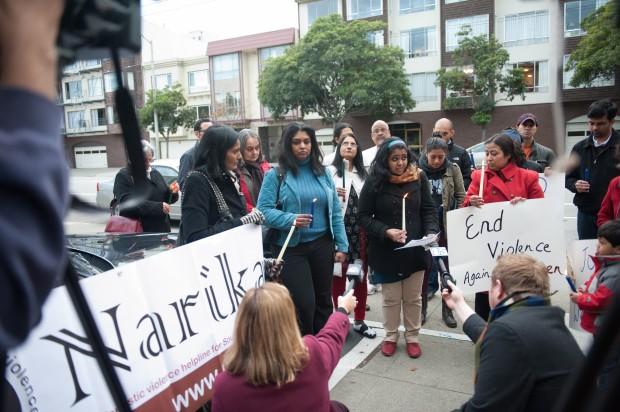Rape in India enhances awareness, leads to tough conversations in U.S.
Activist Preeti Shekar, in black near center, attended a candlelight vigil in San Francisco, organized in response to the rape and murder in December of a young woman in India. (Photo by Anupma Sud.)
Samina Masood remembers certain childhood moments far too well, when she was a girl in Pakistan, raised by her Indian family.
Relatives would visit her home. Some paid too much attention to her.
“Even though I was a part of an educated family, I had to suffer through a lot of sexual exploitation as a young child at the hands of male relatives,” Masood said. “It was taboo to talk about it or even acknowledge it, let alone ask for legal or social or psychological help for it.”
Masood eventually left Pakistan and studied abroad. Today, she works in San Francisco as a therapist.
“I never had a therapist to talk to,” she said, by way of explaining how she wound up in the field. “When I tried to broach the subject of my sexual abuse with my family, it was such an awkward conversation and it caused such so much pain and dishevel, that you were taught that the best way is to just close your eyes and close your ears and not say a word and suffer through it.”
Masood has worked with South Asian women facing sexual and domestic abuse for years, both abroad and in the United States, including at San Francisco’s Asian Women’s Shelter. The shelter is in an undisclosed location. Reporters aren’t allowed to visit.
On occasion, threats are made against the women living there. Advocates stress that women seeking shelter at Asian crisis centers like this are like women fleeing domestic violence anywhere. But they also note that South Asian immigrants face particular challenges.
Maitri is another non-profit in the Bay Area focused on South Asians and domestic abuse. It’s located in an office park. There’s no sign outside. There is a separate, private entrance for clients.
Sonya Pelia, who runs Maitri, said that South Asian cultural norms coupled with immigration complications can leave some women feeling trapped. In a scenario common in Silicon Valley, a South Asian woman can join her husband who already works here. She can typically hold an H-4 or “dependent” visa, which restricts her from seeking authorized work. It can be isolating.
Pelia said that when marriages fail or turn abusive, immigrant women in that position often worry about losing their visas and deportation. Sometimes, there’s the shame and stigma of a failed marriage.
“We will have young women call us and say, ‘I’ll kill myself here, but I won’t go back,’” Pelia said.
Meanwhile, she added, the woman’s family back home might be told that there is “something defective” with their daughter for the marriage not to work, which can compound tension — and, at times, abuse — between the couple back in the United States.
“We find many times the violence is orchestrated long-distance,” Pelia said.
Pelia also noted that domestic abuse cuts across class lines.
“It happens to women who are physicians, who are nurses, who are engineers, who are highly educated,” Pelia said. “I think societal pressure is the key denominator here.”
Maitri’s hotline receives thousands of calls a year from immigrant women seeking help. The group assists them in finding jobs, apartments, transportation — and immigration lawyers. In some cases, attorneys file Freedom of Information Act requests to recover paperwork from husbands, who sometimes hide documents.
Yet Pelia is starting to see positive change.
“When we first started doing outreach, when I joined the agency 19 years ago, I could spend an entire day in a crowd of 5,000 people, standing behind the Maitri table and not one person would come by,” Pelia said. Her group, she felt, was considered “making much ado about stuff that should be fixed and solved within the family.”
Now, she said, more women approach the group and ask about their rights.
Following the December gang rape and murder of young student in a bus in New Delhi, vigils have been held in the United States. In the Bay Area, there have been vigils in Fremont, home to a large South Asian community.
Preeti Shekar, a young immigrant from India, organized the country’s first vigil. She runs Narika, a Bay Area-based group focused on domestic violence and South Asians.
Shekar said that since the rape in India calls, to Narika’s hotlines have increased. She’s also had some tough conversations at home.
“Some of my family members were like, ‘Why are Indian men violent?’” she said. “Men are violent everywhere. It’s not Indian men, it’s not unique.”
She emphasized that “we are all part of these systems where we, sometimes willing or unwilling, have embraced these regressive notions of women.”
Shekar said she embraces discussions like this. In fact, she’s now working with other activists in California to hold a large, public discussion about gender violence in the South Asian community next month.
